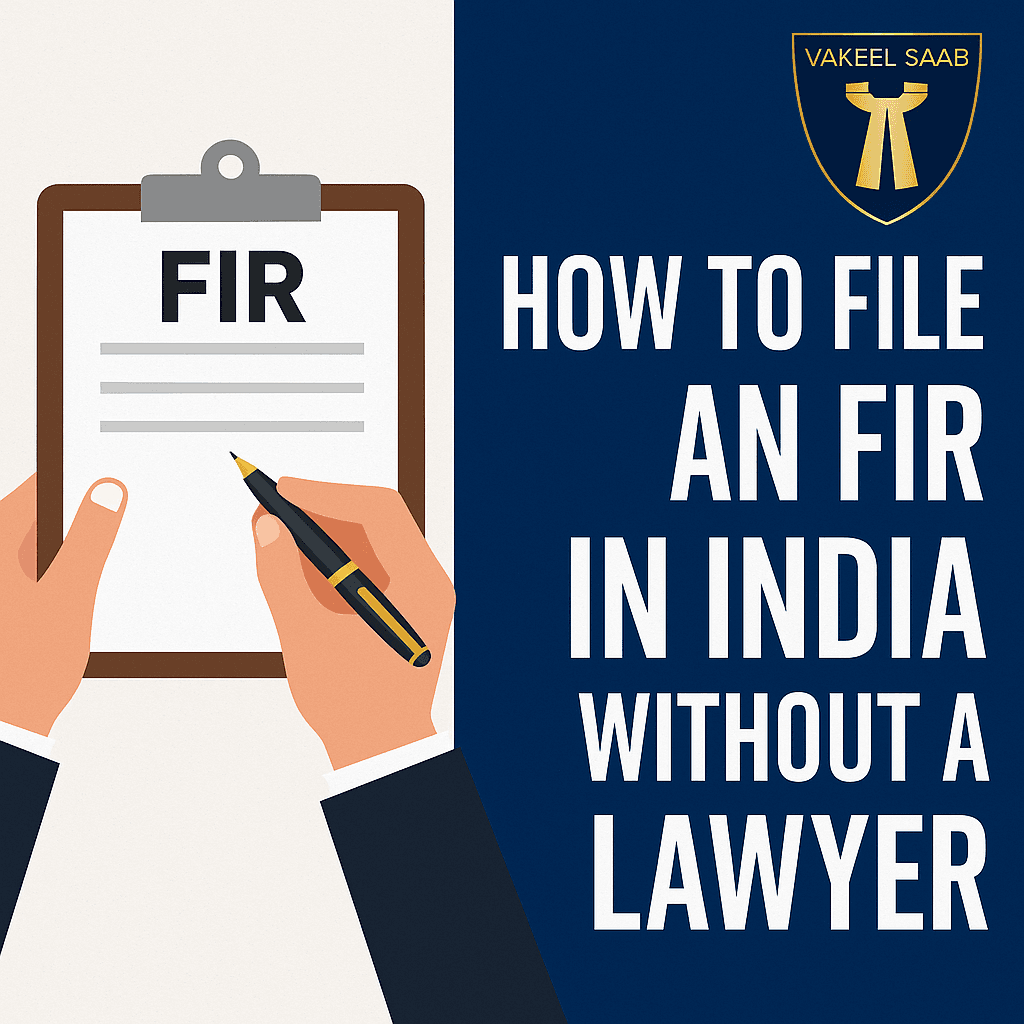What is an FIR? How to File an FIR in India Without a Lawyer | Full Legal Guide

Imagine being the victim of a crime, but not knowing where to begin. The first step to justice in India often starts with an FIR — the First Information Report. Many people hesitate, thinking they need a lawyer to file it. The truth? You can file an FIR in India without a lawyer, if you know the right process. This guide by Vakeel Saab explains everything you need to know.
An FIR (First Information Report) is the written document prepared by the police when they receive information about the commission of a cognizable offence. Filing an FIR is the gateway to initiating criminal proceedings in India. In this article, we’ll explain what an FIR is in India, the FIR filing procedure, your rights as a complainant, and how to file an FIR online or in person — without needing a lawyer. For more complex cases, VakeelSaab’s Criminal Lawyers in India can provide valuable guidance and representation.
What is an FIR in India?
The term “FIR” stands for First Information Report. It is defined under Section 154 of the Code of Criminal Procedure (CrPC). An FIR can only be filed for cognizable offences — serious crimes where police have the power to register the case and start investigation without prior approval from a magistrate (e.g., murder, rape, theft, dowry harassment).
- Purpose: To set the criminal law in motion.
- Authority: Registered at the nearest police station with jurisdiction.
- Rights: The complainant has a right to receive a free copy of the FIR.
How to File an FIR in India Without a Lawyer
Contrary to popular belief, you do not need a lawyer to register an FIR. Here’s the step-by-step process explained by Vakeel Saab’s legal experts:
- Visit the Police Station: Approach the police station within whose jurisdiction the crime occurred.
- Or File Online: Many states allow online FIR in India through their official police portals.
- Zero FIR: If you are not in the jurisdiction where the crime occurred, you can file a Zero FIR, which can later be transferred to the relevant police station.
- Draft the Complaint: Clearly mention your name, address, date, time, location, details of the offence, and people involved. This becomes the basis of the FIR.
- Police Registration: The officer in charge will reduce your oral or written complaint into writing, read it back to you, and record it in the FIR register.
- Get a Copy: Ensure you receive a signed copy of the FIR free of cost.
FIR Process in India: Your Rights as a Complainant
- You have the right to have your statement recorded accurately.
- You must receive a free copy of the FIR (CrPC Section 154(2)).
- You can insist on including all relevant details — names, witnesses, facts.
- Women victims of sexual offences can have FIRs recorded by women officers, in the presence of a trusted person.
What if Police Refuse to Register an FIR?
If police refuse to register your FIR, Vakeel Saab recommends the following remedies:
- Approach the Superintendent of Police under Section 154(3) CrPC.
- File a complaint with the Judicial Magistrate under Section 156(3) CrPC.
- Seek assistance through Criminal Lawyer Consultation Online for filing petitions or directions in such cases.
Key Concepts Related to FIR
- Zero FIR in India: Can be filed at any police station, regardless of jurisdiction.
- Cognizable Offence FIR: Filed for serious crimes like murder, rape, kidnapping.
- Non-Cognizable Offence: Police cannot register an FIR; only a Non-Cognizable Report (NCR) can be filed.
- Drafting FIR Complaints: Keep it clear, factual, and chronological to avoid misinterpretation.
When You Should Consult a Criminal Lawyer
While you can file an FIR without a lawyer, professional help is essential in certain cases. Vakeel Saab’s Criminal Lawyers in Delhi and across India can assist when:
- Police delay or refuse to register your FIR.
- The accused is influential or powerful.
- Your FIR is wrongly recorded or altered.
- You need to file writs or petitions in higher courts for FIR registration.
Frequently Asked Questions (FAQ)
Can I file an FIR online in India?
Yes, many states including Delhi, Maharashtra, and Uttar Pradesh allow filing online FIRs in India through state police websites.
What is a Zero FIR?
A Zero FIR in India can be filed at any police station, irrespective of jurisdiction, and later transferred to the appropriate police station.
What if the police don’t give me a copy of my FIR?
It is your legal right to receive a free copy of the FIR. If denied, you can complain to senior police officers or the magistrate. Vakeel Saab can guide you in taking legal remedies.
Do I need a lawyer to file an FIR?
No, you can file it yourself. However, in complex cases, Vakeel Saab’s Criminal Lawyer Consultation Online ensures proper follow-up.
If you are struggling with FIR filing, police refusal, or need guidance in a criminal matter, Vakeel Saab offers expert Criminal Lawyer Consultation Online. Our lawyers in Delhi and across India help you file FIRs, challenge wrongful refusals, and protect your rights effectively. Book your consultation today and let VakeelSaab stand by your side in your fight for justice.
Related Articles
The Importance of Consulting a Property Lawyer for Real Estate Issues
Blog
How to File a POCSO Complaint in India: Step-by-Step Legal Process
Blog
What punishments does the law give for giving, taking, or asking for dowry?
Blog
Reasons for the Increasing Divorce Rates in India
Blog
What is a Special Leave Petition? Meaning, Features, Process & & Who Can File?
Blog
What Is the Difference Between Mutual Divorce and Contested Divorce?
Blog